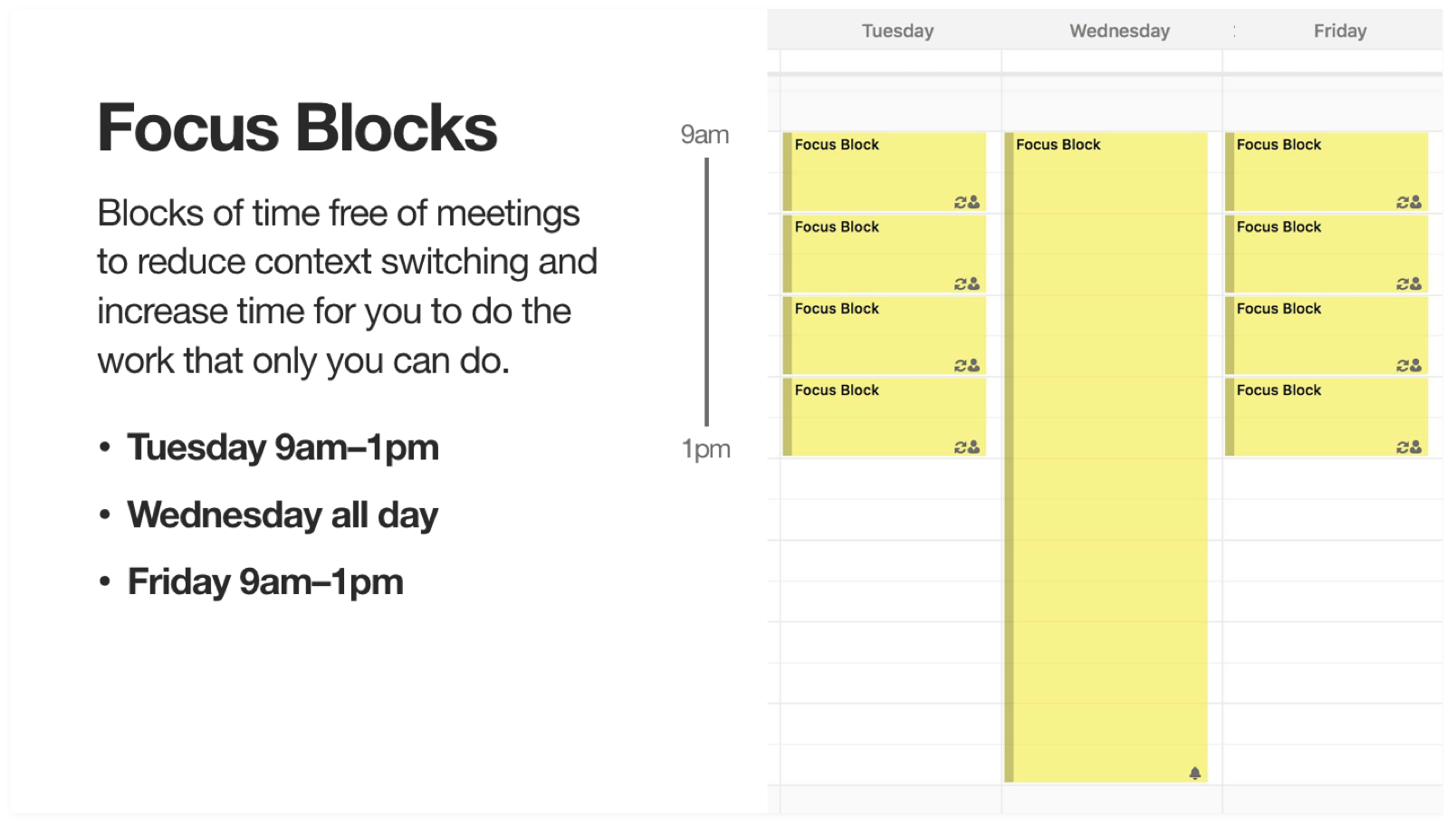Q: The concept of focus blocks is something that I use, but they often get ignored by others (i.e. coworkers schedule over the top of them). Do you have any recommendations for getting others outside your immediate team to respect focus or heads-down time?
A: Focus blocks are pretty amazing when implemented properly. In a nutshell, focus blocks are blocks of time free of meetings or other distractions. Their purpose is to reduce context switching and increase the time for doing work only you can do.
The whole point is to provide flow, or a flow state, when you’re completely immersed in an activity and even lose track of time or temporary needs such as food, thereby increasing the quality or volume (or both) of your output. Most important, I’ve observed team members feel greater satisfaction in their work and greater control over their schedule as flow states increase.
Focus blocks are an effective way to leverage flow at work. You can use focus blocks individually or within your team simply by blocking out times in your calendar—daily in small chunks such as an hour or a couple times a week in larger chunks two to three hours or longer. Meet with your peers and ask for their support. Describe how you will and will not be available during block times. Explain that by having more time to focus on the work only you can do, your output will be more beneficial to the team. Tell them you’ll do it as a trial for X weeks and report back after the initial run.
Pro tip: block times in 30 or 60 minute increments, rather than 2 to 3 hours, as they look more like meetings to would-be overschedulers.
The most effective use of focus blocks, however, occurs at the department, portfolio, or pillar level when cross-functional peers are aligned on shared blocks of focus time. As Head of Design for Facebook Events, I piloted an effort to implement focus blocks across the entire portfolio inclusive of designers, engineers, PMs, data scientists, etc.

Here’s how we implemented cross-functional blocks across our portfolio:
- Interviewed other teams that experimented with focus blocks and learned from their successes and failures.
- Presented a proposal to key leadership peers (Head of Engineering, Head of Product, etc.) describing the purpose of focus blocks, expected outcome, and proposed pilot program.
- The 6-month pilot was simple: Tuesdays & Fridays 9am–1pm and Wednesdays all day would be reserved for focus blocks. Leveraging focus blocks would be individual and optional, but we asked that everyone respect block times and not schedule meetings during these times whether or not they themselves used focus blocks.
- After getting buy-in from leadership peers on implementing a pilot program, I met with engineering managers, PMs, and other managers across the portfolio. We gave them about two months of lead time before starting the pilot so they had time to adjust team meetings and one-on-ones if needed.
- Conducted a survey prior to starting the pilot and another survey after 6 months to compare before/after, asking questions related to managing their time, productivity during work hours, satisfaction sentiment, and so forth.
The initial pilot was very successful. In addition to positive lifts in our own survey, we saw a double-digit positive lift in overall work/life sentiment rated by team members over the course of three company-wide surveys (constituting 18 months), in large part thanks to focus blocks. Eventually other teams across the company began asking for our help to implement focus blocks in their portfolios.
And while we saw greater adoption among individual contributors, managers who leveraged focus blocks also found them to be extremely beneficial to reducing after-hours work and getting back valuable heads-down time for the work only they could do.
My inbox is open if you have additional questions about focus blocks.
–Cameron